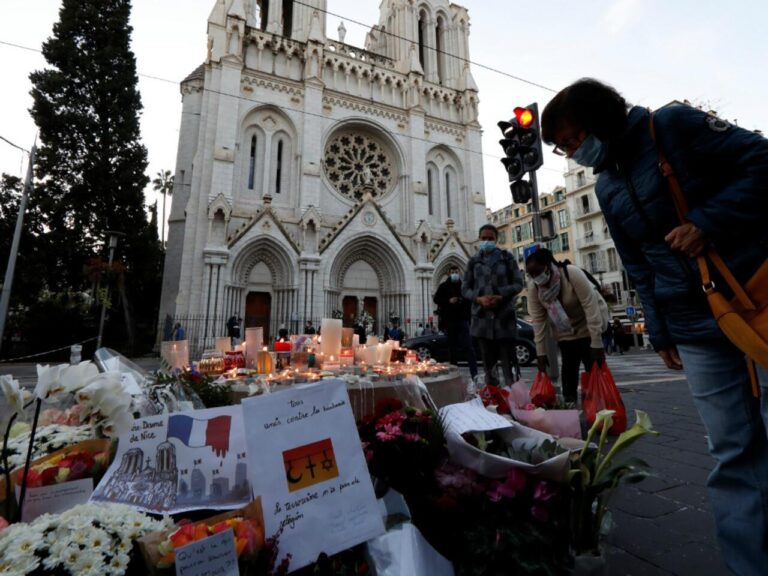In a significant ruling, a French court has sentenced a Tunisian national to life imprisonment for his role in the brutal knife attack at a church in Nice that claimed the lives of three individuals in October 2020. The verdict, delivered by the Criminal Court of Paris, underscores the ongoing fight against terrorism in France, a nation still reeling from a series of violent assaults linked to extremist ideologies. As tensions rise over security and justice, this case highlights the complexities surrounding radicalization and the measures taken by French authorities to safeguard citizens.
French Court Delivers Life Sentence in Church Attack Case
A Tunisian national was sentenced to life in prison by a French court for his involvement in a brutal attack on a church in Nice, which left three individuals dead and several others injured. The incident, which took place on October 29, 2020, was deemed an act of terrorism and highlighted growing concerns over religious extremism in Europe. The court found the accused guilty of multiple charges, including murder and attempted murder with intent to terrorize, emphasizing the premeditated nature of the crime.
During the trial, the prosecution presented a robust case that illustrated the suspect’s motivations, drawing on evidence such as his social media activities and connections with radical groups. The court’s decision reflects the broader context of France’s ongoing struggle with radicalism and has sparked discussions about security measures and community safety. Following the verdict, survivors of the attack expressed a mix of relief and calls for continued vigilance against threats to peace and religious tolerance in France.
Details of the Nice Church Attack and Its Implications
The recent verdict handed down by a French court to a Tunisian national for the 2020 Nice church attack marks a significant moment in the ongoing battle against terrorism in France. The assailant, identified as Brahim Aouissaoui, was convicted of murdering three individuals at the Notre-Dame Basilica, an act that shook the nation and amplified security concerns. This ruling not only reinforces the need for vigilant counter-terrorism measures but also highlights the challenges France faces in addressing radicalization and integration within its borders. Aouissaoui’s motivations were rooted in extremist ideologies, raising urgent questions regarding the effectiveness of preventative strategies against similar threats in the future.
As the court’s decision reverberates through French society, it prompts discussions about broader implications for law enforcement and community relations. Key points include:
- Increase in Security Measures: Authorities are expected to bolster security protocols in public places, particularly in religious sites.
- Ongoing Threat of Radicalization: The incident underscores the persistent risk of radical ideologies permeating communities.
- Legal Precedents: This ruling may serve as a benchmark for future cases involving terrorism, emphasizing the judiciary’s stance on such crimes.
In an effort to align community safety with civil liberties, discussions around potential reforms in immigration and asylum processes are likely to gain traction. Policymakers will face the task of balancing security concerns with the need for inclusivity, prompting a national dialogue on how best to foster integration while mitigating the risks posed by extremist elements.
Reactions from the Victims’ Families and the Community
The sentencing of the Tunisian national for the tragic attack on a Nice church has elicited profound reactions from both the victims’ families and the broader community. Many families expressed a sense of relief and vindication, feeling that justice has finally been served after enduring immense pain and suffering. They shared emotional statements highlighting their ongoing grief and the lasting impact of the attack on their lives, with some emphasizing that while the legal outcome provides a measure of closure, it cannot undo the devastation wrought by the violence.
Community leaders and local residents have also voiced their sentiments, celebrating a united front against extremism while advocating for healing and remembrance. They organized vigils to honor the victims, underscoring the importance of solidarity in the face of terror. The response has included:
- Calls for peace and tolerance – Emphasizing the need for understanding among diverse groups.
- Community support programs – Initiatives aimed at helping those affected by the attack rebuild their lives.
- Public discussions – Forums for sharing experiences and promoting communal resilience.
Security Measures and Policy Recommendations Post-Attack
In the aftermath of the tragic church attack in Nice, it is imperative for authorities to reassess current security protocols and enhance community safety measures. Key strategies should include the deployment of increased surveillance in public areas, particularly around places of worship, to deter potential threats. Additionally, fostering community engagement through partnerships with local organizations can help in identifying and addressing radicalization early. Implementing educational programs focused on tolerance and coexistence may also mitigate the rise of extremism.
Furthermore, a comprehensive policy framework should be established to streamline communication among law enforcement agencies, local governments, and intelligence services. This could involve creating standardized protocols for information sharing and collaboration in counter-terrorism efforts. A focus on mental health resources and rehabilitation programs for individuals at risk of radicalization will be essential. The following table outlines recommended areas of focus for bolstering security measures:
| Security Measures | Policy Recommendations |
|---|---|
| Enhanced Surveillance | Increase CCTV coverage in high-risk zones. |
| Community Partnerships | Engage local organizations for safety initiatives. |
| Information Sharing | Develop standardized protocols across agencies. |
| Mental Health Support | Expand rehabilitation programs for at-risk individuals. |
Key Takeaways
In conclusion, the life sentence handed down to the Tunisian national for the brutal attack on a church in Nice underscores France’s ongoing commitment to combating terrorism and protecting its citizens. This verdict comes as part of a broader effort to address the complexities of radicalization and ensure justice for victims of such violent acts. As France grapples with the ramifications of this case, it remains crucial for authorities to reinforce measures aimed at preventing future incidents, while fostering social cohesion in an increasingly polarized environment. The aftermath of this attack continues to resonate within the community and beyond, serving as a stark reminder of the challenges faced in the pursuit of peace and security.




